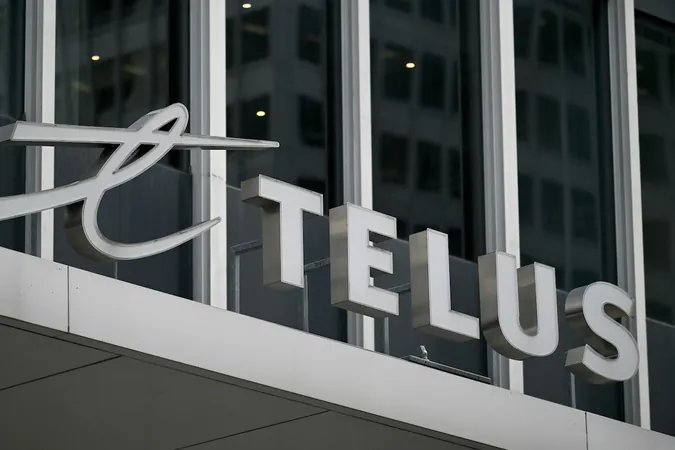
Telus Takes Bold Step by Selling Stake in Tower Network: What This Means for the Canadian Telecom Industry
2025-03-26
Author: Jacques
Telus's Strategic Move
In a groundbreaking move, Telus Corp., Canada's telecommunications giant, has officially placed a stake in its expansive national network of cell phone towers on the market. This decision comes as Telus and other major telecoms, including BCE and Rogers, strive to alleviate their mounting debts and secure funding for future growth initiatives. Analysts estimate that the price tag for Telus's nearly 3,000-tower portfolio could exceed $1 billion.
Auction Details
To facilitate this auction, Telus has enlisted the help of TD Securities, tasked with reaching out to institutional investors and tower operators interested in acquiring a 49.9% stake in the portfolio. The auction, initially launched in February under the discreet code name "Project Air," has attracted significant attention from potential buyers, which include private equity funds, pension plans, and both American and European tower companies.
Financial Overview
Financial documents have revealed that Telus's tower network generated approximately $160 million in revenue last year, contributing to a cash flow of $110 million. These figures have piqued the interest of numerous investors, especially in an increasingly competitive telecom landscape where rivals are contemplating similar divestitures. Such moves could align Canadian telecom giants more closely with global peers, many of whom have been offloading their tower assets for decades.
Analysts' Predictions
CIBC analyst Stephanie Price predicts that the value of Telus's towers could range between $1 billion to $3 billion, while Bank of Nova Scotia's Maher Yaghi has provided a more conservative estimate of $1 billion to $1.5 billion. These assessments suggest that a minority stake sale could potentially raise between $500 million and $1.5 billion. However, Telus appears inclined to proceed only if the bids approach the higher end of the spectrum.
Debt Management Strategies
While Telus aims to find a minority partner for managing the towers, adding tenants like Quebecor or Cogeco to densify network availability, the overall debt of Telus stands at an alarming $29 billion. The company has articulated strategies to lower this debt, including generating $500 million from the sale of obsolete copper infrastructure and possibly accruing up to $3 billion by offloading unnecessary real estate.
Competitive Landscape
Amid these developments, Telus CEO Darren Entwistle has indicated the company's willingness to consider strategic sales as part of its broader economic strategy, emphasizing the importance of economic viability in any such transaction. As the scrutiny of the market persists, it's worth noting that rivals like Bell Canada and Rogers Communications are adopting a watchful approach, monitoring the developments within Telus's sales process. Analysts estimate that Rogers's tower assets could be valued up to $6 billion and BCE's network around $4 billion.
Global Trends in Telecom
Canada has remained relatively unique among developed nations, with most of its telecom carriers holding on to their tower assets, while global trends have leaned toward divestment and outsourcing infrastructure. For example, U.S. carriers typically own only a minor share of their towers—around 3%—while in Europe the figure is about 30%.
Precedents and Challenges
An important precedent was set last year when Rogers announced plans to sell a minority stake in its wireless backhaul to private equity firm Blackstone for approximately $7 billion. However, uncertainty remains regarding its classification as equity or debt, a challenge that Telus could also face during its stake sale.
Capitalizing on Assets
In a broader context, major telecoms globally have been divesting infrastructure to capitalize on evolving technologies. For instance, Verizon raised $3.3 billion by selling 6,339 towers, further emphasizing the trend toward capitalizing on assets to reinvest in future-oriented sectors like fiber networks and artificial intelligence.
Future Opportunities
Canadian asset managers have shown increasing interest in telecom tower investments, and with Canada ranking third worldwide for the ratio of towers to subscribers, the market presents potentially lucrative opportunities for investors. Experts anticipate strong competition from private equity and investment funds eager to stake their claim in this attractive market.
Conclusion
In conclusion, as Telus embarks on this pivotal auction process, the move could not only restructure its financial landscape but also reshape the entire Canadian telecom industry, signaling a shift toward more asset-light operational models that align with global standards. Keep an eye on how this unfolds—it's a pivotal moment for telecom in Canada!









 Brasil (PT)
Brasil (PT)
 Canada (EN)
Canada (EN)
 Chile (ES)
Chile (ES)
 Česko (CS)
Česko (CS)
 대한민국 (KO)
대한민국 (KO)
 España (ES)
España (ES)
 France (FR)
France (FR)
 Hong Kong (EN)
Hong Kong (EN)
 Italia (IT)
Italia (IT)
 日本 (JA)
日本 (JA)
 Magyarország (HU)
Magyarország (HU)
 Norge (NO)
Norge (NO)
 Polska (PL)
Polska (PL)
 Schweiz (DE)
Schweiz (DE)
 Singapore (EN)
Singapore (EN)
 Sverige (SV)
Sverige (SV)
 Suomi (FI)
Suomi (FI)
 Türkiye (TR)
Türkiye (TR)
 الإمارات العربية المتحدة (AR)
الإمارات العربية المتحدة (AR)